#disability memoirs
Text
Full Transcript up at the link.
Quote:
MARSHALL: They did. So I was diagnosed with cerebral palsy at 18 months. But growing up, they just said I had tight tendons. And when I kind of pressed them as I got older and that explanation didn't carry water anymore, they told me I had hemiplegia or hemiparesis, so essentially symptoms of cerebral palsy that indicate paralysis on parts of the body. So they really tried to sidestep the kind of loaded term of cerebral palsy.
Dear Parents, Teachers, Babysitters (and other well-meaning authority figures in a kid's life):
Do Not Do This.
For crying out loud... Why else do you think "Cerebral Palsy" is a loaded term, in the first place?! Jeez Louise! You're not sparing anyone from stigma. You're the ones loading the word with stigma, like filling a wheelbarrow with bovine manure.
#NPR Weekend Edition: 10 June 2023#cerebral palsy#memoir#growing up disabled#well-meaning parents#but#ableism#gay
125 notes
·
View notes
Text
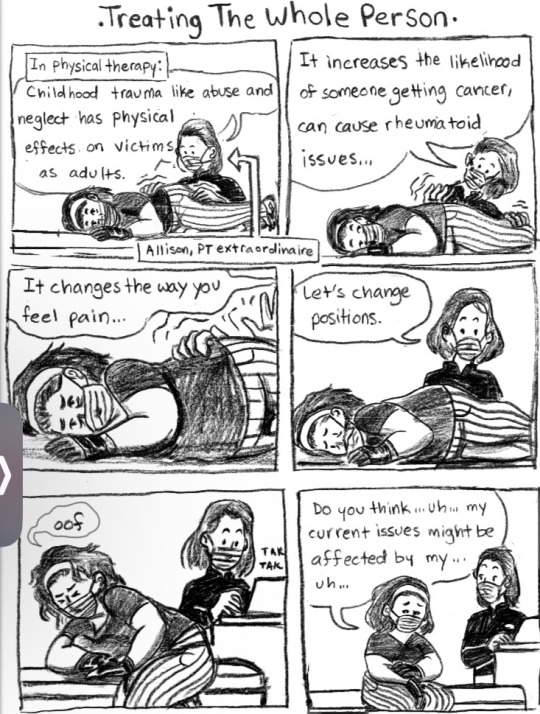

Next part
#comic#comics#proud#drawing#artist#autobio comics#graphic medicine#memoir#cartoon#chronic pain#osteoarthritis#osteogenesis imperfecta#genetics#genetic bone disease#brittle#brittle bone disease#arthritis#graphic novel#ptsd#bipolar#physically disabled#physical therapy#therapist#therapy#patientcare#trauma#book#comic books#bookworm#book quotes
21 notes
·
View notes
Text
Exile and Pride: Disability, Queerness and Liberation by Eli Clare
goodreads

First published in 1999, Exile & Pride established Eli Clare as one of the leading writers on the intersections of queerness and disability. With this critical tenth-anniversary edition, the groundbreaking publication secures its position as essential to the history of queer and disability politics, and, through significant new material that boldly interrogates and advances the original text, to its future as well. Clare’s writing on his experiences as a genderqueer activist/writer with cerebral palsy permanently changed the landscape of disability politics and queer liberation, and yet Exile & Pride is much too great in scope to be defined by even these two issues. Instead it offers an intersectional framework for understanding how our bodies actually experience the politics of oppression, power, and resistance. At the heart of Clare’s exploration of environmental destruction, white working-class identity, queer community, disabled sexuality, childhood sexual abuse, coalition politics, and his own gender transition is a call for social justice movements that are truly accessible for everyone.
Blending prose and theory, personal experience and political debate, anger and compassion, Exile & Pride provides a window into a world where our whole selves in all their complexity can be loved and accepted.
Mod opinion: I‘d heard of this book before, but I hadn‘t really read the description before and now that I have I‘m really, really excited to read it someday!
#exile and pride#eli clare#trans books#trans lit#trans literature#lgbt books#lgbt literature#lgbt lit#nonfiction#memoir#disability studies#own voices#genderqueer#nonbinary#polls#to read
21 notes
·
View notes
Text
"A Very Special Day" [Life Story]
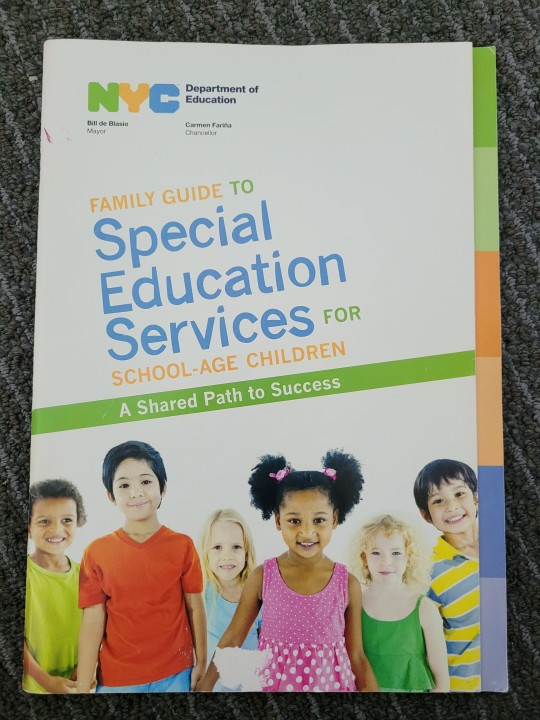
[TW for: ableism against kids, internalized ableism, and mentions of suicidal ideation.]
9 years ago today, in the state of New York on September 5th, was my second day of 6th grade. Being a Special Ed kid, I was upset; my school, a K-8 that I had been with since the start and stayed with until the end, had always treated us so differently. And the world around me had promised that things would change once middle school began. But they hadn't. In fact, barely anything was new at all.
Same old baby talk from adults who saw me every day, but willfully ignored how big I had grown.
Same old bullying from my peers, disabled children who spent their days as pots calling kettles black, because no one had any intentions of teaching us better.
Same Adapted Phys Ed, getting ready to interrupt my morning reading every Monday, Wednesday, Friday; even though they'd promised to let me play in Gym with the rest of my class years ago by now.
Same old kids from the neighborhood filling up the rest of my grade, coming in smiling and laughing and oh so free in their new groups of 30. 30-something of them. 12 of us.
They'd even gotten some new kids from the K-5s around town. All of which seemed really nice. Man. Lucky them. Meanwhile, everything was so same-y that I'd considered running away from the school bus when it pulled up.
September 5th, 2014. Still kinda hot in Brooklyn. Sunny out there.
The day had gone bad. My classmates were talking FNAF, and being mean about things I don't remember. They flicked food at me during lunch while I tried to read and mind my own business. We weren't allowed to change seats, even though the rest of our grade got that privilege. It was supposed to be for all of us middle schoolers, but when I'd asked the day before, our lunch aide had no idea what I was on about. She suddenly insisted it was never a thing! While the rest of our grade was splitting into cliques behind her back, paying us no mind, knowing they'd somehow earned it and we didn't.
10-year-old me couldn't wait to go home.
By the end of the day, I was drained like no other. Head down on the desk and all. I was thinking, 2:20-something. Just a few more minutes.
God, why are things like this? Is it gonna get better later this year? I hope so, it's only the second day. Maybe it just starts bad!
Man, I miss summer already. I wish I spent today home all day eating onion ring chips again and playing Animal Crossi--
"Alright guys, listen up!" Said Mrs. Z, who would pretty much be our only teacher this year. (Meanwhile, everyone else got to have different people for different subjects.)
I don't remember her exact words. But she held up a white booklet with a bunch of kids holding hands and awkwardly smiling at us from the mostly-white cover. She said something about it being very important. And she ended her little stanza with, and I quote, "DON'T read these, alright? It's for your parents."
I think that one line changed the trajectory of my life.
As our para handed them out, my bookworm ass couldn't help but furrow my little brows. I'd had teachers assume certain books were "too hard" for me when they weren't, and get upset at me whenever I summarized the plot of them correctly. I'd had teachers tell me not to read other books during class, which was fair enough, I guess. But a teacher telling me not to read something at ALL?
Now THAT'S a new one...
It felt plasticy, not like paper. It's a packet, not a book. Six kids in a row, but none look like me, as usual. The cover said, "Family Guide To Special Education Services for School-Age Children. A Shared Path to Success." ...I don't think a title should be that long. Why not parentheses that end bit?
After that, we were dismissed. Me & some peers headed into the hallway down to the first floor to wait for our bus, and we chatted about it a little bit?
One was like, "Is this a report card or something?"
Another was like, "I guess?"
The first boy skimmed it, though, and saw nothing about him. Which eased his nerves.
A third asked me what I thought it was since I was the only kid who'd hit a Z-reading level. They figured I could make sense of it. And my first thought was boring adult stuff, or some sort of... after-school? Program? Thing? But I didn't really answer. I was too preoccupied with what Mrs. Z said.
What kind of teacher tells me not to read something? Give it to my parents is one thing, but specifically, "don't" read this? Dude! What doesn't she want me to see?
Everyone else had tossed the damn thing into their bookbags and zipped 'em up by now. We headed downstairs, and I couldn't help but notice that our 6th grade class was on the third floor; with a lot of grades 2-4 around us.
Meanwhile, the rest of the big middle school classes came down from higher up. It turns out that they all had their classes high up on the top floor. A bunch of bright minds floated down from above like they were that summer's fireflies, and we were the tips of night grass. Or maybe even worms, burrowing into the dirt and calling it a day.
...
By the time the bus was moving, I still had the packet in my hands. I was wondering why they all got to be up there and we didn't. We lived pretty close to Coney Island, after all: it must be cool seeing the parachute jump from the hallway window on your way down every day.
I barely had time to stuff the packet in my hands once we pulled up to my apartment.
If you've ever wondered what Kid Jonah was like, imagine some sort of hybrid between a miserable little nerd & the most optimistic goody-goody you've ever met. Like, yeah, I'd been in a few fights by this point, broken some rules behind their backs, but I was also... 10. And known for being "THE good kid" in front of teachers. I didn't like to defy them, you know? Even if they did always make me feel weird, or on-edge, or like I was a part of something bad.
So when I made a beeline for my room, I was like, Oh my God, I'm actually gonna do this...? And I didn't tell my parents a thing. I've kept the packet all this time and they STILL haven't read it!
But I did. I think I hesitated, but I remember opening it on my bed.
"Welcome.
Dear families, we've come a long way since our special education reform initiative, A Shared Path to Success, was launched citywide in 2012... we've also been changing hearts and minds as our core belief- that special education is a service, and not a place- has taken hold in our schools...
Section 1... Children learn at different speeds and in different ways. Some children have physical and/or intellectual disabili..."
WHAT?!
...
It was a really dense packet for a kid. Long, boring, seemed endless. But I understood the words. Especially that D one. And at the time, 10-year-old me knew it was a bad one.
I'd crossed the point of no return by then. I kept reading. And I didn't dare skip a word. "Intervention," "Special," "Disability," "Meeting," "Evaluation," "Eligibility," "IEP,"-- Hey, I know that word! IEPs are the dense things stapled to my report cards!
I remember the anger flaring in my heart, out my nose, widening my eyes once I got to the Eligibility bit. I thought, and I quote, "THEY THINK WE'RE DISABLED?!" I don't think words can articulate how insulted little 10-year-old me was!
...I don't think I can articulate how sad that is now, either. How do you instill such heavy ableism into a little boy like that? How do you live with yourself?
But I couldn't throw the book at the wall or take one of my mom's lighters to it like I initially wanted. Because I realized pretty quickly... Oh my God. This is it. These are THE ANSWERS! THIS IS WHY IT'S ALL HAPPENING!
I couldn't believe my eyes as I took it all in. The 13 disabilities that landed me and my friends in this mess, some of which matched up with certain kids I knew right away. But what really caught my attention were the services. Terms that I KNEW about. Things I engaged with. Things I... hated.
"Occupational Therapy." That nice older lady who takes me out of class every few days so I can play memory games, or play with this hand-gripper, or yank pegs outta this bright green putty.
"Paraprofessional Services"; those weird second-teachers that annoy us and only us, but never anyone else in the other classes. They're so stuck-up sometimes! And they never really seem to know how to leave us alone. Especially certain kids.
The stories I could tell about them all now... good fucking lord.
Physical Therapy; That's the one where the lady is always making me feel bad about things and do sit-ups or run drills in the hallway and stairwell... and do embarrassing stretches like people aren't walking by.
And she got upset with me because I brought a lunchbox every day for years; she told me, "You'll never be a big kid if you keep bringing food from home, Jonah!"
And I told her, "But my mom doesn't even make the sandwiches anymore! I make them for myself!"
And she was like, "But still!"
She also measures her footstep, saying it was a foot of distance. Like, 12 inches. But nuh-uh, it was never a foot! Her sneakers aren't that big. Rulers are longer. Why didn't she just get a measuring tape? What's this lady's problem?
The one that sunk my heart, though, was Adapted Phys Ed. The packet said it was "A specially designed program of developmental activities, games, sports, and rhythms suited to the interests, capabilities, and limitations of individual children who may now safely or successfully participate in the activities of a regular physical education program."
And I thought: ...That's the watered-down gym class I do three times a week.
The one where we do "challenges" like stepping into each hole of an agility ladder mat and doing a squat before moving to the next.
The one where we never play sports like everybody else gets to do.
The one that makes the gym teacher sit me out on the bleachers by myself, and watch literally everybody else I know have fun. And when I ask why, nobody tells me anything.
The one where I ask how I can improve in order to go play with everybody else, but nobody tells me anything.
The one where Mrs. D keeps promising me that I'll get to play with the rest of my class soon... but it never comes true.
This is why everybody acts so weird around us.
This is why we can't even talk to the rest of our grade.
This is why nothing ever changes...!
It all made sense. 10-year-old me couldn't feel the floor or the bed anymore. The back of my mind buzzed like shaken soda, fizzling against the back of my skull. I didn't cry. I didn't have tears. But I did sink down, down into the depths of I-don't-even-know-where.
I went time-traveling back to May of last school year, where a Special Ed kid the grade above me was saying to his classmate, "We're all just the kids nobody wants." But I didn't have context. Was this the context? He sounded like he was about to cry.
I went back to 4th grade when I headed into the bathroom and saw two kids from my grade walk by with papers promoting the talent show to everybody. I saw the text written on them clear as day! And I got excited; Our school's having a talent show? COOL! We must be getting those later today, too!
The papers never came.
I went back to 3rd grade, where paras would hover over our class during lunch, but nobody else's. They always stood tall above and between us, like they were a scarecrow keeping the birds of our grade away.
And there was so much. More. Than that.
...
I still wonder why Z didn't want me seeing that. Maybe she knew I would spiral or label myself. But at the same time... that's a learned behavior. Ableism is a hatred, and hatred is learned. From ADULTS. One that she and the rest of the school could at least try to curb if she noticed.
Z wasn't a bad lady. I think she was trying to protect me? But... we already knew we were being treated unfairly. Why would keeping this secret protect me?
The anger only lasted a little while. Because something else dawned on me.
I can't stay here.
This place had been upsetting me for YEARS. And now I knew that it was happening for a reason. A shitty one, but still... a reason. It's not just bad luck. And that it wasn't going to change unless I removed that reason from their minds.
I had to leave. Sound familiar?
The next day we had school? I was completely shaken up. Kinda surprised no one noticed. I was finally seeing just how deep this all went. The teachers smiling in my face, baby-talking, getting reallll close while having this sense of disgust in their eyes.
The staggering difference in numbers between "normal" classes and ours.
Our class locations.
I even found this board on the first floor that had a picture of every teacher and what they taught. Sure enough, "Special Education" was specified in the label for every teacher I'd ever had. I was even able to find the next teachers I'd have for Grades 7 & 8. And my blood went cold because I knew those two particular ladies were pretty mean.
My school was DEFINITELY failing that, "Special Ed is a service, not a place!" shit the state allegedly wanted to accomplish. It was a place. And I... was trapped.
And I couldn't stay trapped. Because as far as I knew, education was everything. I was a very academic little boy back then. And I didn't know what staying in a place like this could mean for my education later down the line.
I didn't want to find out.
I also didn't want my social life restricted like this. Especially since there weren't many kids who treated me well. I wanted freedom. I wanted independence. I wanted a chance to actually find real friends!
And this is sad, but... I was already very depressed by that age. Due to the nature of Special Ed at school. Had been since 8. And so... I made a plan in my bedroom the same night I found the packet:
I can't carry this environment with me into high school. I have to do anything-- EVERYTHING I can to get outta here by the time 8th grade starts! And if I fail... I can't finish 8th grade like that.
The Verrazzano Bridge and the walkway by the water, the one with the short fence that I can get right over, are only a fifteen minute walk from home. If I don't get out of Special Ed by 8th grade, then... I have to go out there and throw myself off. I have to kill myself. I have to...! Because I know for a fact I just can't. Stay. Here.
And I was serious. Dead-serious. Because I thought about it every day for the next 2 years straight.
...
That packet started it all for PB. And as sad as it is that I technically had to go behind adults' backs just to learn something about myself and where I was, I'm extremely glad it happened. Because it's also what kickstarted my interest in disability topics. My journey in learning who we were, what we were, and what we do & don't deserve.
It led to the first drafts of PB just under a year later, which set my life on a completely new path. Paperboy would not EXIST if it weren't for that day. Hell; I don't even know if my OTHER projects (like Weirder Than Usual) would, either!
That wasn't right. None of that was right. But it did give me a story to tell. One that you guys are finally starting to see!
And one that I'm very, very proud of.
Disability conversations are extremely important to me now. I don't think I'm the beacon of anti-ableism or anything like that. I know I've fucked up as I grew up, especially in my younger years. But this entire situation showed me how hush-hush the world likes to be about it. And while it's better now than it was in 2014, it ain't great yet.
And I think I owe it to 10-year-old Jonah to change that shit. Because when he googled "Special Ed makes me feel bad," he barely found anything.
It was definitely an experience I will never forget. And as you saw above, I still keep that packet with me to this day, and I always will, because of just how heavily it changed my life.
I have no idea where or who I'd be if it wasn't for that.
Happy 9th birthday, SpEd packet. Can't wait for the 10th!
#paperboy pb#disability#disabilities#disabled kid#disabled kids#special education#special ed#disabled writer#disabled artist#actually autistic#autistic#autism#asthma#life story#thoughts#memoir#memories#childhood#childhood trauma#childhood nostalgia#anti ableism#ableism exists#ableism tw#internalized ableism#ableism#ableist teachers#ableist language cw
31 notes
·
View notes
Text
'We're Not Broken'- Garcia, Eric
Subtitle: Changing the Autism Conversation
Discusses: Autism, Autism Stereotypes, The Disabled Experience, Education, Healthcare, LGBTQ+ Identities, POC identities, USA
Published: 2021
Publisher: Mariner Books
Available Formats: Paperback, Hardback, Audiobook, Ebook, Kindle Edition
For more information on summaries, content warnings and additional tropes, see here:
#books#disability books#disability#disability representation#lgbtq+#lgbtq books#lgbtq representation#autism#neurodivergence#non fiction#memoir#usa#link
8 notes
·
View notes
Text
'i cant relate to lesbian/gay/bi characters or memoirs bc im aroace' no one gives a shit . stop shitting on stuff because its not your life experience. also kind of hilarious like ok go lock yourself in your bubble of reading only the perspectives of those exactly like you...
#im not black but i read black books im not a trans woman but i read memoirs of transfems#im not physically disabled or jewish or vietnamese or this and that#you shouldnt have to share everything to relate and like
6 notes
·
View notes
Text
Daily Book - Deaf Utopia: A Memoir - And a Love Letter to a Way of Life
Deaf Utopia
Nyle DiMarco
Adult Memoir, 2022, 317 pg
memoir by a Deaf Italian-American queer male actor and model
Before becoming the actor, producer, advocate, and model that people know today, Nyle DiMarco was half of a pair of Deaf twins born to a multi-generational Deaf family in Queens, New York. At the hospital one day after he was born, Nyle “failed” his first test—a hearing test—to the joy and excitement of his parents.

View On WordPress
#Deaf Utopia#Nyle Dimarco#2020s#300 pg#adult books#celebrity#lgbt nonfiction#lgbtqia#male protagonist#memoir#nonfiction#queer books#deaf rep#disabled rep#queer#queer rep#daily book
17 notes
·
View notes
Text
There are few things worse, I think, than reading a call to action memoir that is so close to right but really should have been shelved for at least 5yrs before going to print so the author has time to learn enough to see all the false equivalencies that really hinder the point
#personal;#yeah fatphobia is bad but dont you dare act like people aren't asking disabled people to medically alter themselves every day???#you compare bariatric and gender affirming surgeries in such a way that makes the latter sound easy to get??#and in fact don't at ALL go into the struggles for transition care except for a nod at FL while comparing us (trans people)#to fat people like our lives are Much Easier instead of /oppressed by the same white colonial structures that enforce fatphobia/#but go off i guess#i was giving a lot of leeway when i was just side eyeing the comparisons with racism bc i'm not fat and i've not experienced enough racism#to say either way on those#but the MOMENT she started using trans and disabled comparisons i about lost it#and also randomly started calling it antisemitic (sure as much as it's violnt to all poc) in the last chapter with nothing supporting it#like you can tell it was written over the course of the last like 2 maybe 3 years without enough space to breathe#i have listened to a book on writing memoir so often i've got some of it all but memorized#and i agree that if it's more recent than a decade you're probably too close to be writing it#and this author's writing mostly about during pandemic times. this is more a journal and call to action than memoir#but its not polished enough to be a proper call to action bc there's not much it gives you to do other than 'stop dieting & dare to be fat'#which isn't an effective call to action when only those most harmed by fatphobia can act on it you know???#lots of complaints#3/10#edit: reiterting that i'm not saying it'#*it's not anti-semitic; just that a good published work of this kind doesn't make last second claims and certainly not ones#they haven't already explicitly supported in the text#i feel the need to clarify with the very very vocal rise of anti semitism esp in the left#like yes there are anti-Semitic ties. she didn't name them. just said 'they exist lol' and this went to print#great study in poor research slipping onto shelves bc topic matter is relevant
2 notes
·
View notes
Text
“I don’t feel like being strong, but do I have a choice? It hurts when even my sisters look at me in the street with cold and silent eyes. I am defined as other in every group I’m a part of. The outsider, both strength and weakness. Yet without community there is certainly no liberation, no future, only the most vulnerable and temporary armistice between me and my oppression.”
– Lorde, Audre (1980). The cancer journals. Penguin Classics.
#quotes#audre lorde#the cancer journals#actually disabled#breast cancer#cripple punk#disabled community#kinesixtape crackles#memoirs of disabled folks
2 notes
·
View notes
Text
"Thunder Dog", A Review and Personal Anecdote
The Review
Thunder Dog is the dual story of Michael Hingson and his guide dog, Roselle, surviving the descent from the World Trade Center on September 11, 2001. It is also the biography of Hingson living with a disability in the United States and the challenge of living blind in a world designed for the sighted. It is a moving biography worth reading in and of itself. But perhaps it has come back into greater relevance with today’s discussion of emotional support animals and service dogs in the news.
The book is titled Thunder Dog after Roselle. Roselle, like any service dog, is at her core still a dog. Michael Hingson’s highly trained service dog, off duty, is afraid of thunder. In the wee hours of September 11th, there was a thunderstorm and Hingson woke up to a frightened dog. He left the bed to comfort Roselle. Later that day, harness on, Roselle ignores the sound of explosions and scent of jet fuel to safely guide Hingson down 1400+ stairs and through the chaos that was Ground Zero. Hingson frankly writes about the challenges of being a service dog handler, from the idiosyncrasies of working with animals — often trained to be intelligently disobedient to prevent their handlers from hurting themselves — to the challenges of dealing with able-bodied people. While I cannot place where in the book the comment is from, Hingson states that to him the more interesting story isn’t how he and Roselle got down the stairs. The interesting story is how a blind man became a successful businessman and was on the 78th floor to begin with — a story told interspersed with the descent from the North Tower. I agree with Hingson. It is an incredible story.
As a formerly able-bodied person coming to terms with limitations, it’s poignant to see how Hingson handles the challenges placed in front of him from both the well meaning and the ignorant. It is a book that I believe would encourage a little more understanding from both sides of the able/disabled spectrum.
"Service animals are defined as dogs that are individually trained to do work or perform tasks for people with disabilities. Examples of such work or tasks include guiding people who are blind, alerting people who are deaf, pulling a wheelchair, alerting and protecting a person who is having a seizure, reminding a person with mental illness to take prescribed medications, calming a person with Post Traumatic Stress Disorder (PTSD) during an anxiety attack, or performing other duties. Service animals are working animals, not pets. The work or task a dog has been trained to provide must be directly related to the person’s disability. Dogs whose sole function is to provide comfort or emotional support do not qualify as service animals under the ADA." -- Americans with Disabilities Act, https://www.ada.gov/service_animals_2010.htm
A Different Handler’s Story
“Are you training him for someone?”
“Yes, me.”
Chekov and I are not a normal team. He is a glorious rescue mutt. We think he’s a shepherd/husky/cattle dog mix. I am thin, young, and look perfectly healthy on the average day — if you don’t realize my shoulder dimples are in fact, shoulder subluxations. We’re working with an unconventional company to train him. Most of the time, people are quite pleasant when they speak to me about Chekov. Perhaps it’s the “resting bitch face”, or the decade training horses, that has given me a stronger no-nonsense vibe. Most skeptics seem to avoid confrontation with us, preferring to shoot dirty looks our way. But talk to anyone who has been a handler for long enough and you’ll find horror stories. I’m waiting for ours, because it will come.
Intelligent disobedience is the animal’s act of disobeying a command that will cause a handler harm. Chekov is a medical alert dog, trained to let me know when my body is about to throw me a curve ball. As a stubborn horsewoman, I rarely listen. Chekov knows it’s his job to make me stop and listen to him. He’s discovered the most effective way to do so: inform the world that he has husky vocal chords and husky lungs. Chekov will start with a light “tweety” sound before all out shrieking at me. He does this both at home, and in public. His last song was in the wine section of our grocery store — hardly the place I wanted to sit down on the floor!
"A person with a disability cannot be asked to remove his service animal from the premises unless: (1) the dog is out of control and the handler does not take effective action to control it or (2) the dog is not housebroken. " -- Americans with Disabilities Act, https://www.ada.gov/service_animals_2010.htm
A singing husky is not out of control, and we cannot be asked to leave due to Chekov performing a task. But I’m quite certain it is what will run us into access issues in the future. There are plenty of reasons why a service dog might bark or make noise. Most of the time, it means a handler could very well be in distress within a few minutes or few hours and needs the time to react. Please give handlers space if you hear their dog bark.
But how do i spot a fake?
You don’t!
There are no registries for service dogs in the United States (other countries have different regulations). No companies that a person must go through. Service dogs have bad days. They’re not robots, and sometimes they’re just tired/sore/woke up on the wrong side of the bed. Hassling a handler — who likely is having a bad day too — is simply cruel.
If you see a dog that is misbehaving and the handler is doing nothing to stop it, the best action to take is alerting the management in charge of the facility you’re in and let them handle it.
"When it is not obvious what service an animal provides, only limited inquiries are allowed. Staff may ask two questions: (1) is the dog a service animal required because of a disability, and (2) what work or task has the dog been trained to perform. Staff cannot ask about the person’s disability, require medical documentation, require a special identification card or training documentation for the dog, or ask that the dog demonstrate its ability to perform the work or task." -- Americans with Disabilities Act, https://www.ada.gov/service_animals_2010.htm
Lastly, please remember that these dogs are not robots. When someone brings a pet into a service dog only area, it is an unfair distraction to the service dog. Even if your dog is well behaved, it needs to stay at home. If your dog has health issues, then it should go to a dog day care with attached vet — not with you everywhere. Chekov has been charged several times by off leash or uncontrolled dogs. While we are working on desensitizing him to the sudden appearance of dogs in places they shouldn’t be, it is an unfair double standard to expect no reaction from a service dog if a pet is barking aggressively at them. There is an understandable higher expectation of training and behaviour of a service dog. But every pet owner should train their dog and expect excellence. Our dogs, after all, only know what we teach them.
— L.J & Chekov
#Thunder Dog#September 11#9/11#biography#memoir#book review#service dog#guide dog#emotional support animal#ground zero#blindness#disability
10 notes
·
View notes
Photo
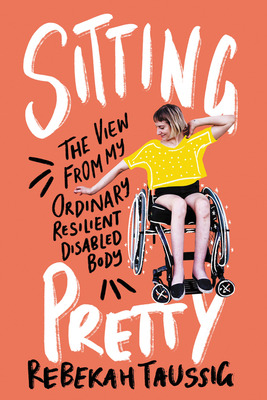
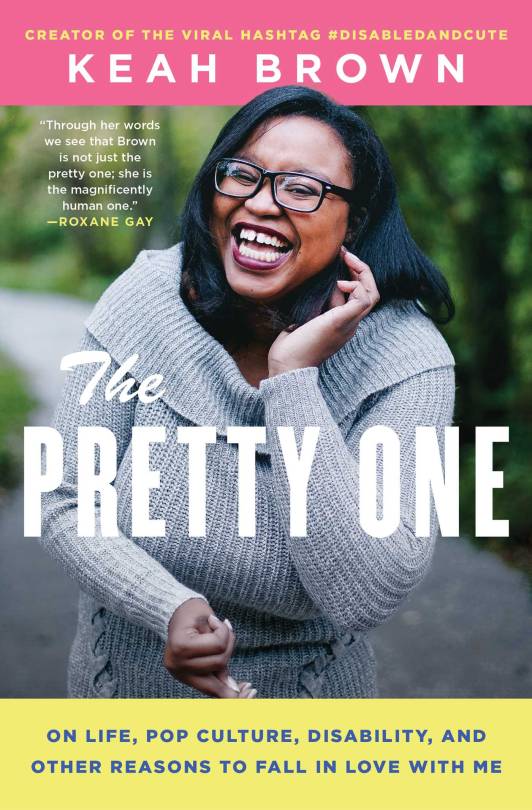
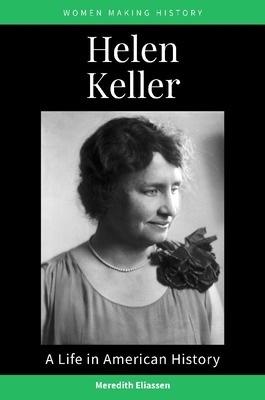
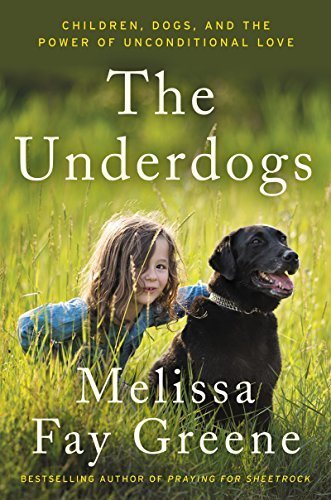
Disability Pride Month: More Nonfiction Recommendations
Sitting Pretty by Rebekah Taussig
A memoir-in-essays from disability advocate and creator of the Instagram account @sitting_pretty Rebekah Taussig, processing a lifetime of memories to paint a beautiful, nuanced portrait of a body that looks and moves differently than most.
Growing up as a paralyzed girl during the 90s and early 2000s, Rebekah Taussig only saw disability depicted as something monstrous (The Hunchback of Notre Dame), inspirational (Helen Keller), or angelic (Forrest Gump). None of this felt right; and as she got older, she longed for more stories that allowed disability to be complex and ordinary, uncomfortable and fine, painful and fulfilling.
Writing about the rhythms and textures of what it means to live in a body that doesn’t fit, Rebekah reflects on everything from the complications of kindness and charity, living both independently and dependently, experiencing intimacy, and how the pervasiveness of ableism in our everyday media directly translates to everyday life.
Disability affects all of us, directly or indirectly, at one point or another. By exploring this truth in poignant and lyrical essays, Taussig illustrates the need for more stories and more voices to understand the diversity of humanity. Sitting Pretty challenges us as a society to be patient and vigilant, practical and imaginative, kind and relentless, as we set to work to write an entirely different story.
The Pretty One by Keah Brown
From the disability rights advocate and creator of the #DisabledAndCute viral campaign, a thoughtful, inspiring, and charming collection of essays exploring what it means to be black and disabled in a mostly able-bodied white America.
Keah Brown loves herself, but that hadn’t always been the case. Born with cerebral palsy, her greatest desire used to be normalcy and refuge from the steady stream of self-hate society strengthened inside her. But after years of introspection and reaching out to others in her community, she has reclaimed herself and changed her perspective.
In The Pretty One, Brown gives a contemporary and relatable voice to the disabled—so often portrayed as mute, weak, or isolated. With clear, fresh, and light-hearted prose, these essays explore everything from her relationship with her able-bodied identical twin (called “the pretty one” by friends) to navigating romance; her deep affinity for all things pop culture—and her disappointment with the media’s distorted view of disability; and her declaration of self-love with the viral hashtag #DisabledAndCute.
Helen Keller by Meredith Eliassen
This book provides new and exciting interpretations of Helen Keller's unparalleled life as "the most famous American woman in the world" during her time, celebrating the 141st anniversary of her birth.
Helen Keller: A Life in American History explores Keller's life, career as a lobbyist, and experiences as a deaf-blind woman within the context of her relationship with teacher-guardian-promoter Anne Sullivan Macy and overarching social history. The book tells the dual story of a pair struggling with respective disabilities and financial hardship and the oppressive societal expectations set for women during Keller's lifetime. This narrative is perhaps the most comprehensive study of Helen Keller's role in the development of support services specifically related to the deaf-blind, as delineated as different from the blind.
Readers will learn about Keller's challenges and choices as well as how her public image often eclipsed her personal desires to live independently. Keller's deaf-blindness and hard-earned but limited speech did not define her as a human being as she explored the world of ideas and wove those ideas into her writing, lobbying for funds for the American Federation for the Blind and working with disabled activists and supporters to bring about practical help during times of tremendous societal change.
The Underdogs by Melissa Fay Greene
The Underdogs tells the story of Karen Shirk, felled at age twenty-four by a neuromuscular disease and facing life as a ventilator-dependent, immobile patient, who was turned down by every service dog agency in the country because she was “too disabled.” Her nurse encouraged her to tone down the suicidal thoughts, find a puppy, and raise her own service dog. Karen did this, and Ben, a German shepherd, dragged her back into life. “How many people are stranded like I was,” she wondered, “who would lead productive lives if only they had a dog?”
A thousand state-of-the-art dogs later, Karen Shirk’s service dog academy, 4 Paws for Ability, is restoring broken children and their families to life. Long shunned by scientists as a man made, synthetic species, and oft- referred to as “Man’s Best Friend” almost patronizingly, dogs are finally paid respectful attention by a new generation of neuroscientists and animal behaviorists. Melissa Fay Greene weaves the latest scientific discoveries about our co-evolution with dogs with Karen’s story and a few exquisitely rendered stories of suffering children and their heartbroken families. Written with characteristic insight, humanity, humor, and irrepressible joy, what could have been merely touching is a penetrating, compassionate exploration of larger questions: about our attachment to dogs, what constitutes a productive life, and what can be accomplished with unconditional love.
#disability pride month#disabilities#memoir#biography#Library Books#nonfiction#nonfiction books#nonfiction reads#Nonfiction Reading#Book Recommendations#book recs#Reading Recs#reading recommendations#TBR pile#tbr#tbrpile#to read#Want To Read#Booklr#book tumblr#book blog#library blog
3 notes
·
View notes
Text

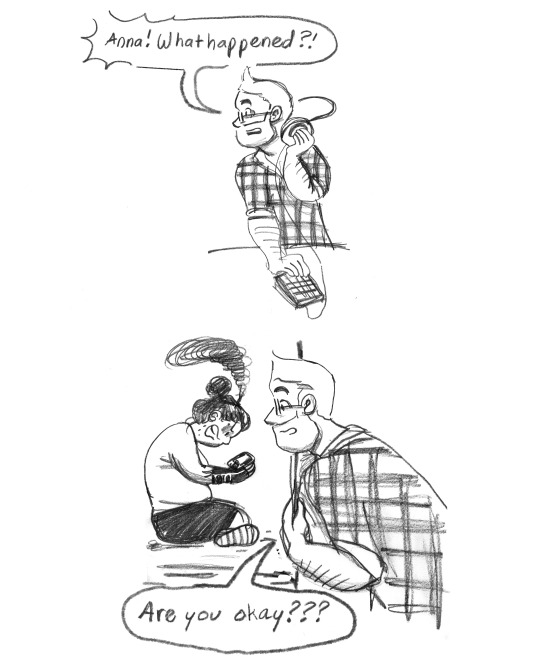
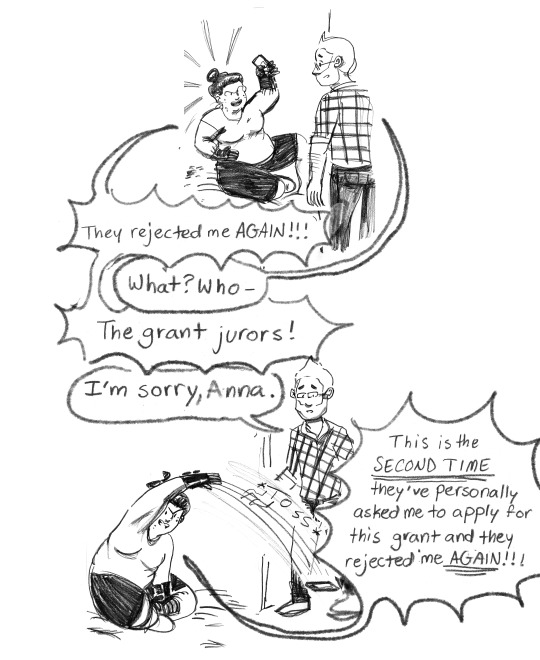
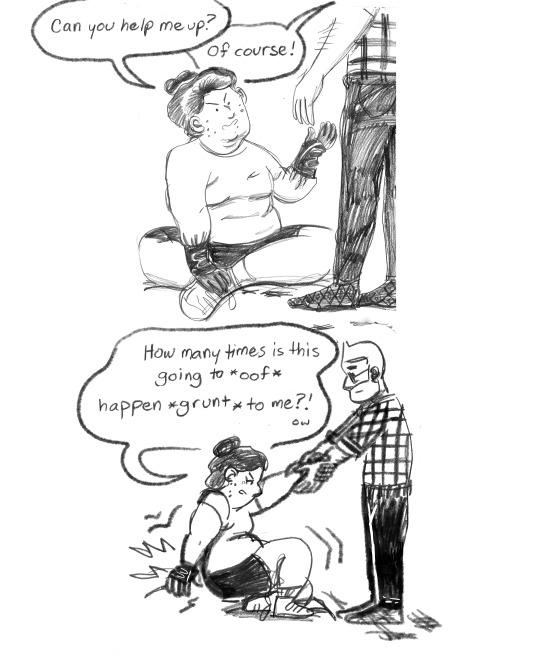
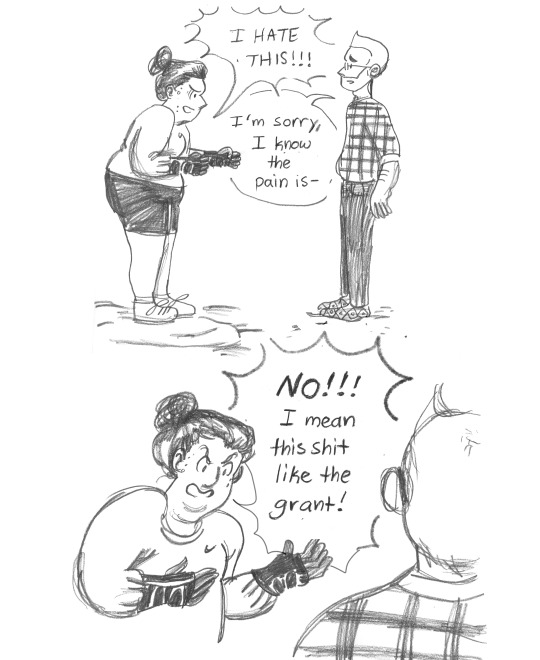

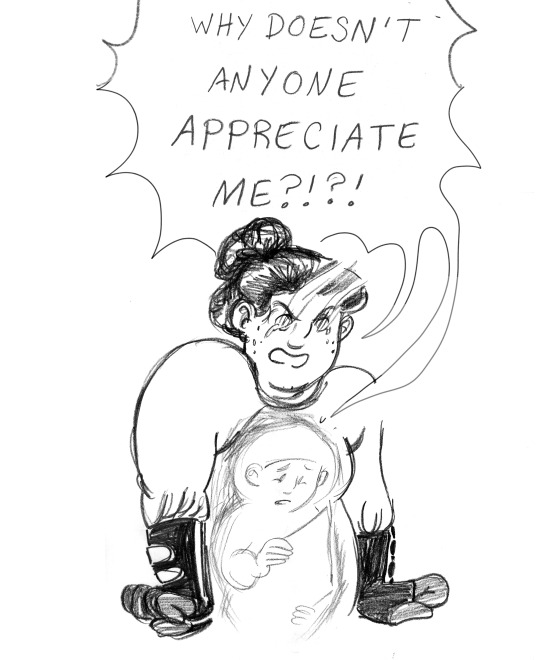

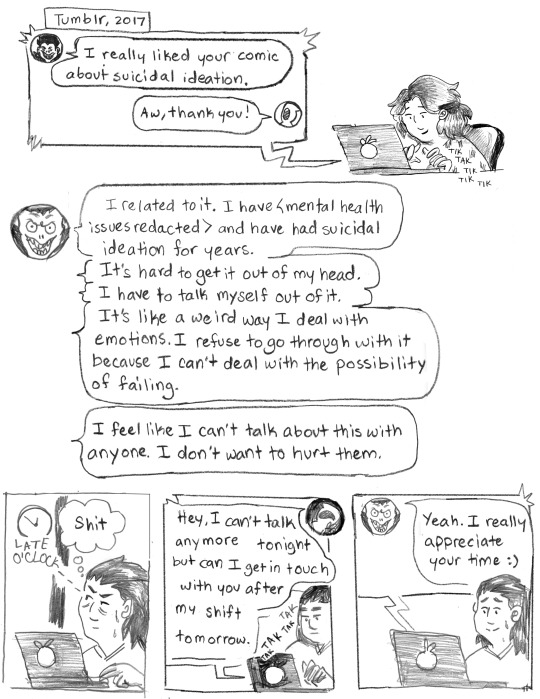
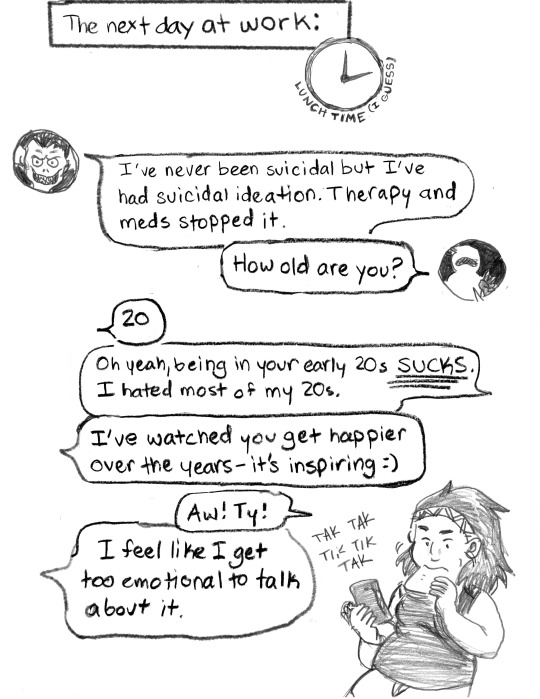
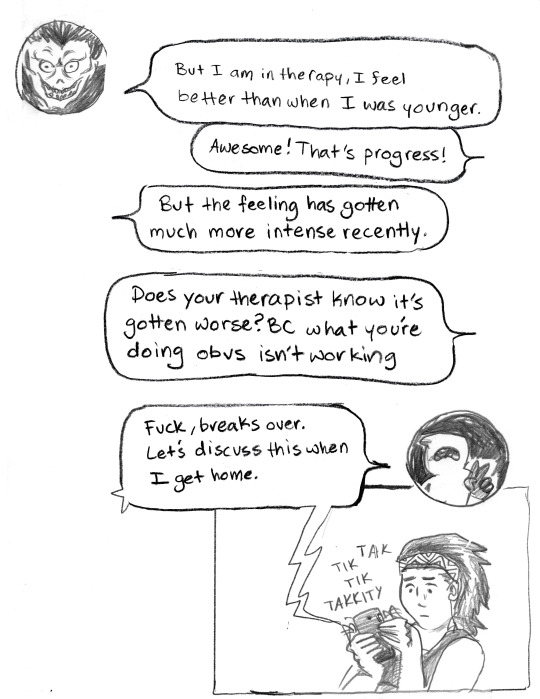

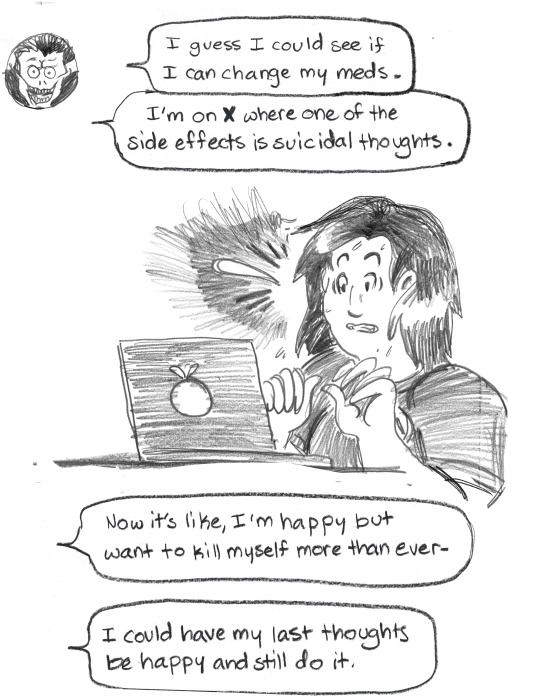
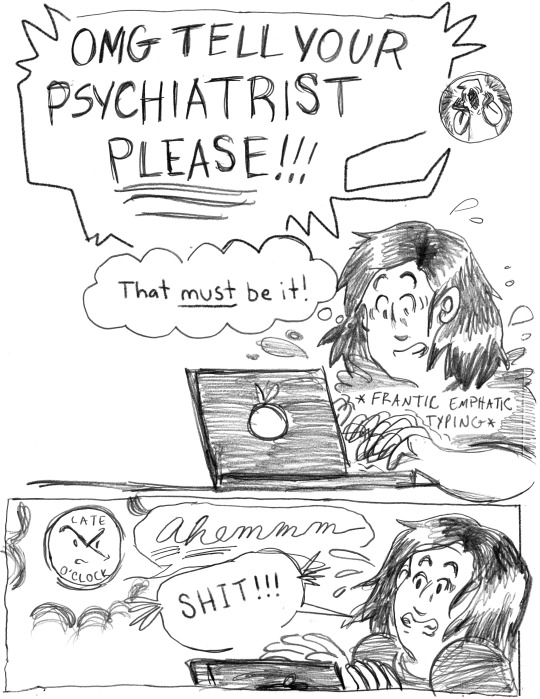
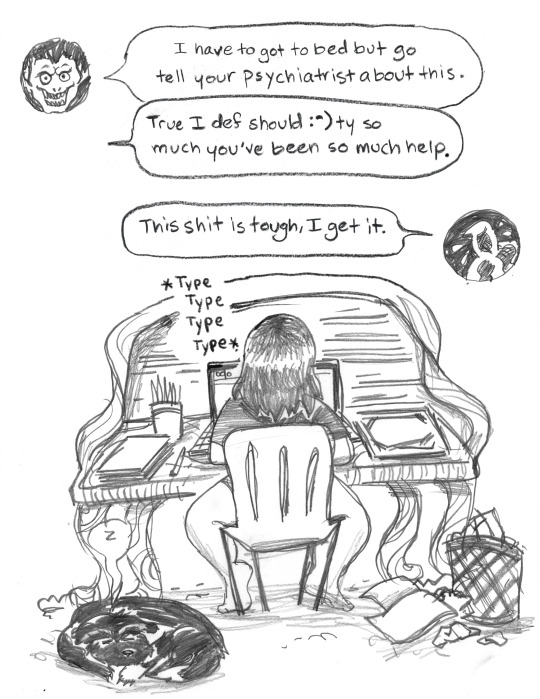


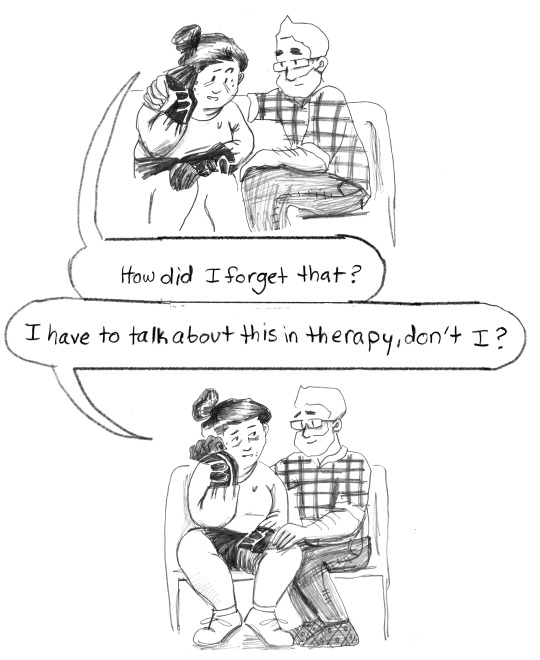

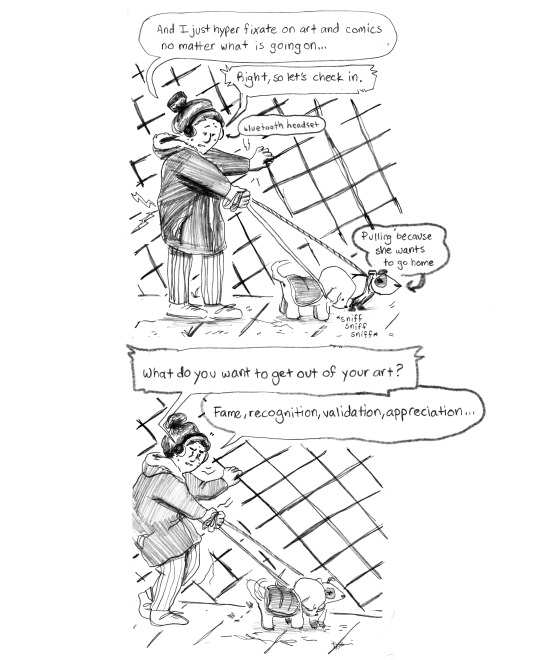
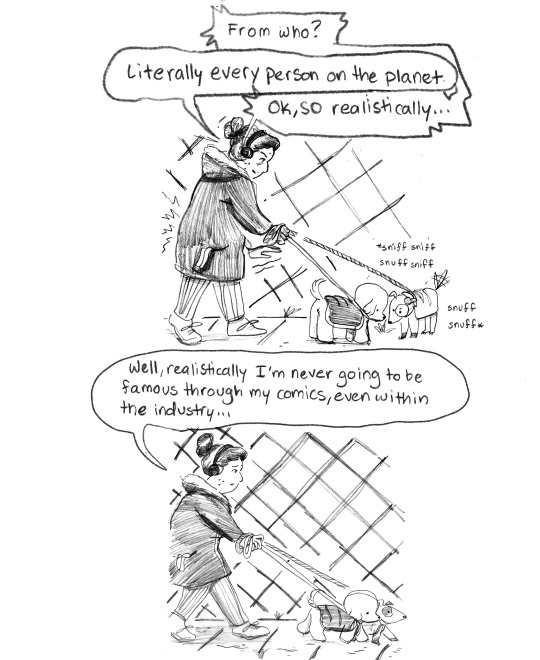
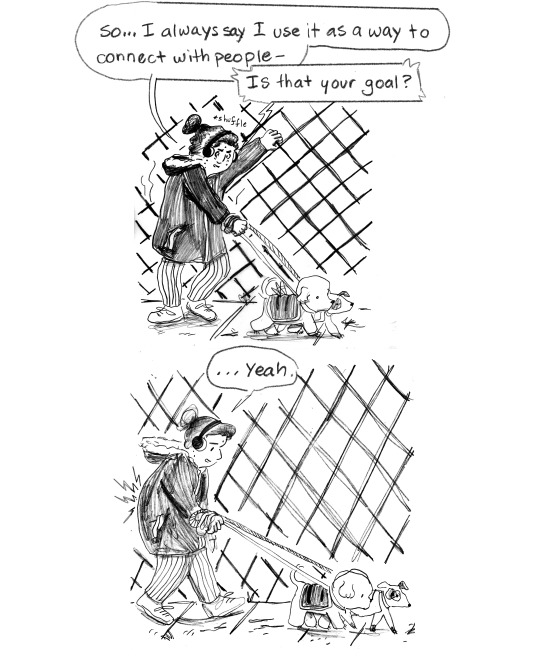
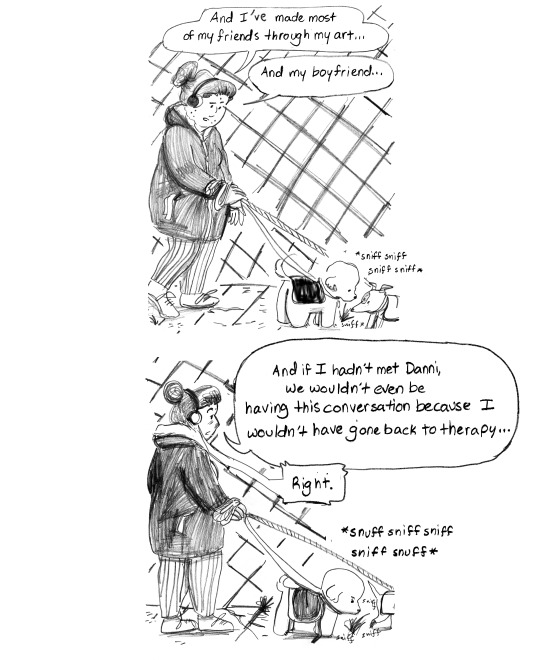
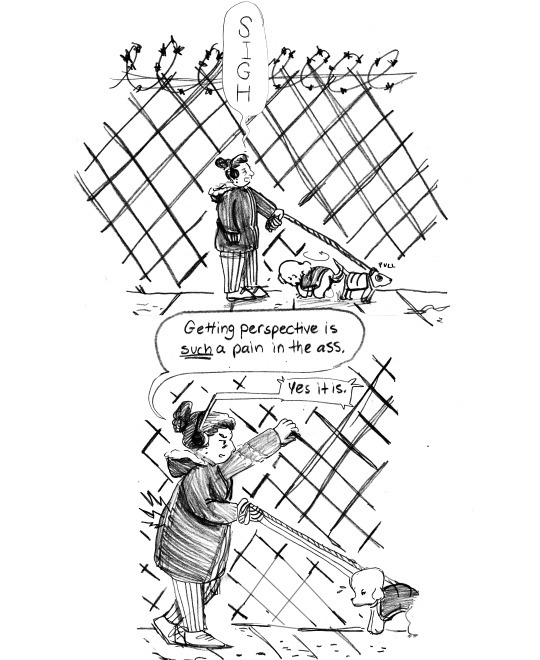
next part
#comic#comics#proud#sketch#autobio comics#artist#mental health#ptsd#ptsd recovery#therapy#graphic novel#graphic medicine#art#artists on tumblr#drawings#community#inner child#inner thoughts#art books#booklr#books#comic books#book quotes#bookblr#memior#memoir#mid 30s#eating disorder#chronic pain#disabled
14 notes
·
View notes
Text
Suture: Trauma and Trans Becoming by KJ Cerankowski
goodreads
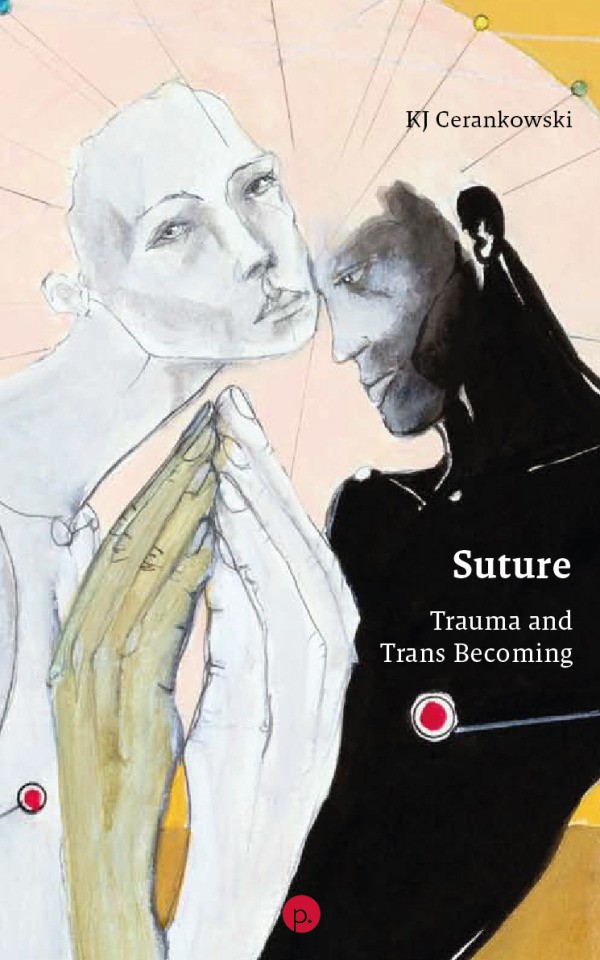
Combining memoir, lyrical essay, and cultural criticism, KJ Cerankowski’s Suture: Trauma and Trans Becoming stitches together an embodied history of trauma and its ongoing impacts on the lived realities of trans, queer, and other marginalized subjects. Suture is a conjuration, a patchwork knitting of ghost stories attending to the wound as its own archive. It is a journey through many “transitions”: of gender; through illness and chronic pain; from childhood to adulthood and back again; of psyche and form in the wake of abuse and through the work of healing; and of the self, becoming in and through the ongoingness of settler colonial violence and its attendant subjugations of diverse forms of life.
Refusing a traditional binary-based gender transition narrative, as well as dominant psychoanalytic narratives of trauma that center an individual process of symptom, diagnosis, and cure, Suture explores the refractive nature of trauma’s dispersed roots and lingering effects. If the wounds of trauma are disquiet apparitions—repetitions within the cut—these stories tend the seams through which the simultaneous loneliness of mourning and togetherness of queer intersubjective relations converge. Across these essays, healing, and indeed living, is a state of perpetual becoming, surviving, and loving, in the nonlinearities of trauma time, body-time, and queer time.
Mod opinion: I've read this book and it is really good. Made me cry a bunch.
#suture trauma and trans becoming#KJ Cerankowski#polls#trans lit#trans literature#trans books#lgbt lit#lgbt literature#lgbt books#memoir#non fiction#disability#own voices#nonbinary
3 notes
·
View notes
Text
trying to find an interesting rock climbing memoir for my dad's birthday but like oh my goddddd shut UP about mount everest shut UP about free ascents shut up shut up shut UP
#if anyone has any recs hmu#especially on the lookout for memoirs from physically disabled climbers#but everything i've found on that search so far is from disabled EX-climbers. which wouldn't suit my dad's interests as much
2 notes
·
View notes
Text
'How to Live Free in a Dangerous World'- Lawson, Shayla
Subtitle: A Decolonial Memoir
Discusses: Race, Gender, Disability, Ehlers-Danlos Syndrome, Travel, Recovery, Drag Culture, Death, Poetry, Identity
Published: 2024
Publisher: Tiny Reparations
Available Formats: Hardcover, Kindle Edition
For more information on summaries, content warnings and additional tropes, see here:
#books#disability books#disability#disability representation#lgbtq books#lgbtq+#lgbtq representation#black writers#poc#ehlers danlos syndrome#memoir#essays#poetry#non binary#non fiction#link
4 notes
·
View notes
Text
I'm listening to Hannah Gadsby's memoir today and it is just delightful!
2 notes
·
View notes